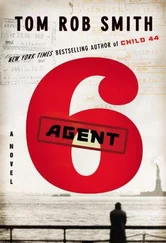Tom Smith - Secret speech
Здесь есть возможность читать онлайн «Tom Smith - Secret speech» весь текст электронной книги совершенно бесплатно (целиком полную версию без сокращений). В некоторых случаях можно слушать аудио, скачать через торрент в формате fb2 и присутствует краткое содержание. Жанр: Триллер, на английском языке. Описание произведения, (предисловие) а так же отзывы посетителей доступны на портале библиотеки ЛибКат.
- Название:Secret speech
- Автор:
- Жанр:
- Год:неизвестен
- ISBN:нет данных
- Рейтинг книги:5 / 5. Голосов: 1
-
Избранное:Добавить в избранное
- Отзывы:
-
Ваша оценка:
- 100
- 1
- 2
- 3
- 4
- 5
Secret speech: краткое содержание, описание и аннотация
Предлагаем к чтению аннотацию, описание, краткое содержание или предисловие (зависит от того, что написал сам автор книги «Secret speech»). Если вы не нашли необходимую информацию о книге — напишите в комментариях, мы постараемся отыскать её.
Secret speech — читать онлайн бесплатно полную книгу (весь текст) целиком
Ниже представлен текст книги, разбитый по страницам. Система сохранения места последней прочитанной страницы, позволяет с удобством читать онлайн бесплатно книгу «Secret speech», без необходимости каждый раз заново искать на чём Вы остановились. Поставьте закладку, и сможете в любой момент перейти на страницу, на которой закончили чтение.
Интервал:
Закладка:
Leo didn’t move for several minutes. Then, slowly, he reached forward, pulling the parcel toward him. They lived inside a ministerial compound. Letters were normally left at the gate: this had been left on his doorstep. The parcel was about thirty centimeters long, twenty centimeters wide, and ten centimeters deep. There was no name, no address, just an ink drawing of a crucifix. Ripping the brown paper, he saw a box, the top of which was stamped:
NOT FOR PRESS
The metro carriage wasn’t crowded yet Elena took hold of Raisa’s hand, gripping it tightly, as if fearful they were about to be separated. Both girls were unusually quiet. Leo’s behavior this morning had unsettled them. Raisa couldn’t understand what had come over him. Normally so careful around the girls, he’d seemed to accept that they were about to sit down for breakfast and witness him preoccupied by that word: torture. When she’d asked him to take the sheet of paper away, his cue to pull himself together, he’d obeyed only to return to the kitchen in exactly the same disheveled state, staring at the girls and not saying a word. Bloodshot eyes, a haunted, ragged look: she hadn’t seen that expression for years, not since his returns from all-night assignments as a secret police officer, exhausted and yet unable to go to bed. He’d slump in the corner, in the dark, brooding, silent, as though the events of the previous night were playing over and over in his mind like a looped reel of film. During that period he’d never spoken about his work yet she’d known what he’d been doing, arresting indiscriminately, and she’d secretly hated him for it.
Those times were past. He’d changed-she was sure of it. He’d risked his life to break from a profession of midnight arrests and forced confessions. The State Security apparatus still existed, renamed the KGB, remaining a presence in everyone’s life, but Leo played no part in its operations, having declined the offer of a high-ranking position. Instead, taking a much greater risk, he’d opened his own investigative department. Every night he shared stories of his working day, partly because he sought her advice, partly to show how different his department was from the KGB, but mostly to prove there were no more secrets between them. Yet her approval wasn’t enough. Observing him around the girls, it struck Raisa that he behaved as if he were cursed, a character in a children’s fairy tale, and only the words- I love you- spoken by both girls, could break the dark magic of his past.
Despite his frustrations, he’d never shown any jealousy of Raisa’s easy relationship with Elena and Zoya even when Zoya deliberately tormented him by being openly affectionate to her and cold to him. Over the past three years he’d withstood rejection and rudeness, never losing his temper, soaking up hostility as if he considered it nothing less than he deserved. In the face of this, he’d made the girls his only hope of redemption. Zoya knew it and reacted against it. The more he sought her affection, the more she hated him. Raisa couldn’t point out the contradiction, or tell him to relax. Once fanatical about Communism, he was now fanatical about his family. His vision of utopia had been made smaller, less abstract, and though it now encompassed only four people, rather than the entire world, it remained just as elusive.
The train pulled into TsPkiO station, abbreviated from its full name, Tsentralnyl Park Kulturyi Otdykha Imeni Gorkovo. The first time the girls had heard it formally read out over the PA system they’d started to laugh. Caught unaware by this chance absurdity, Zoya had revealed a beautiful smile that, up until then, she’d kept locked out of sight. In that moment Raisa caught a glimpse of the child that had been lost-playful and irreverent. Within seconds Zoya’s smile had been wiped away. Raisa had felt an intense pain. She was no less emotionally involved. She and Leo had been unable to have children of their own: adoption was her only hope of motherhood. However, she was by far the better at concealing her thoughts, even if Leo had been trained by the secret police. She’d made a tactical decision, careful that the girls not be constantly aware of how important they were to her. She treated them without fuss or ceremony, establishing functional foundations-school, clothes, food, going out, homework. Though they both went about it in different ways, she shared Leo’s dream-the dream of creating a loving, happy family.
Raisa and the girls exited the station on the corner of Ostozhenka and Novokrymskiy, following a path dug through the snow on their way to their respective schools. Raisa had wanted to enroll both girls at the same school where, ideally, she also would have taught so that the three of them could have been together. However, the decision had been made, either by the school authorities or at a higher level, that Zoya would attend Lycee 1535. Since it only accepted secondary students Elena was forced into a separate primary school. Raisa had resisted since the majority of schools accepted both primary and secondary students and there was no need to split them up. Her request had been declined. Siblings were at school to create a relationship with the State, not to shelter within family ties. According to that rationale, Raisa was lucky to get a job at Lycee 1535 and so she’d relinquished the demand in order to preserve the advantage. At least this way she was able to keep an eye on Zoya. Although Elena was younger and had been more obviously nervous about the prospect of a new school in a large city, Zoya concerned Raisa far more. She’d fallen further behind academically, her village school not being up to Moscow’s standards. There was no question that she was intelligent. But it was unpolished, directionless, ill-disciplined, and, unlike Elena, Zoya steadfastly refused to make any efforts to fit in, as if it were a matter of principle that she remain isolated.
Outside the primary school, a converted prerevolutionary aristocratic town house, Raisa took an unnecessary amount of time tending to Elena’s uniform. Finally, holding her close, she whispered:
– Everything’s going to be okay, I promise.
For the first few months Elena had cried when she’d been separated from Zoya. Though she’d gradually adjusted to spending eight hours apart, at the end of every school day, without exception, she’d stand by the gates eagerly awaiting their reunion. Her excitement at seeing her older sister return hadn’t diminished, a reunion as full of joy as if a year had passed.
After Zoya had given her sister a hug, Elena hurried into school, pausing at the doors to wave good-bye. Once she was inside, Zoya and Raisa walked in silence toward the Lycee. Raisa resisted the urge to question Zoya. She didn’t want to agitate her before class. Even the simplest of inquiries risked putting her on the defensive, setting off a chain of disruptive behavior that rippled throughout the day. If she asked about schoolwork it was an implicit criticism of her academic achievements. If she asked about her classmates it was a reference to her refusal to make any friends. The only subject open to discussion was Zoya’s athletic abilities. She was tall and strong. Needless to say, she hated team sports, unable to take orders. Individual sports were a different matter-she was an excellent swimmer and runner, the fastest in the school for her age. But Zoya refused to compete. If entered into a competition she would deliberately forfeit the race, although she had enough pride not to come last. She’d aim for fourth, and since she occasionally mistimed it, or forgot herself in the heat of the moment, she might come in third or even second.
Built in 1929, Lycee 1535 was angular and stark in design, intending to embody an egalitarian approach to learning, a new kind of architecture for a new kind of student. Twenty meters from the gates Zoya stopped walking, remaining fixed to the spot and staring straight ahead. Raisa crouched down:
Читать дальшеИнтервал:
Закладка:
Похожие книги на «Secret speech»
Представляем Вашему вниманию похожие книги на «Secret speech» списком для выбора. Мы отобрали схожую по названию и смыслу литературу в надежде предоставить читателям больше вариантов отыскать новые, интересные, ещё непрочитанные произведения.
Обсуждение, отзывы о книге «Secret speech» и просто собственные мнения читателей. Оставьте ваши комментарии, напишите, что Вы думаете о произведении, его смысле или главных героях. Укажите что конкретно понравилось, а что нет, и почему Вы так считаете.












